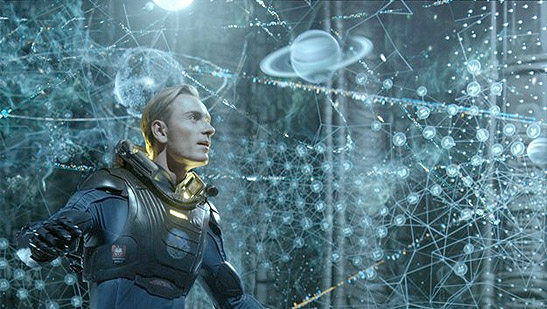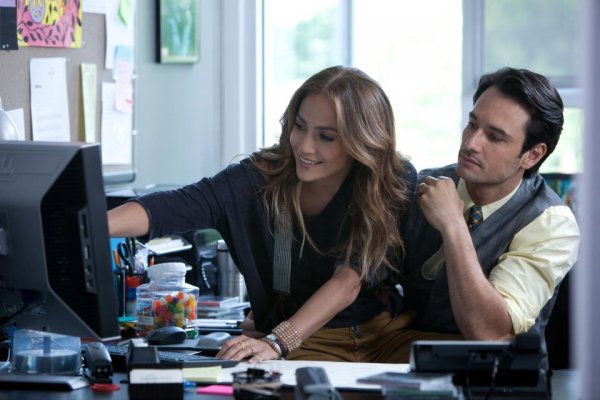PROMETHEUS
 Saturday, June 2, 2012 at 9:46AM
Saturday, June 2, 2012 at 9:46AM Stars: Noomi Rapace, Michael Fassbender, Charlize Theron, Idris Elba, Logan Marshall-Green, Guy Pearce, Rafe Spall, Sean Harris, Benedict Wong, Emun Elliott and Kate Dickie.
Writers: Jon Spaihts and Damon Lindelof.
Director: Ridley Scott
Running time: 124 minutes
Rating: 2.5/5

For his return to the science-fiction genre, Ridley Scott has pinned his hopes upon a freshly-conceptualized retooling of the franchise he inadvertently began with a keen eye on launching another one. Prometheus, his prequel-of-sorts to the 1979 classic Alien, honours the mythology of the series and convincingly replicates key beats in the over-arching narrative of the four films.
As hinted at by the interminable series of trailers, the story follows two scientists, Elizabeth Shaw (Noomi Rapace) and Charlie Holloway (Logan Marshall-Green) on a journey to a distant planet, the co-ordinates of which have been deduced by symbols discovered amongst the ruins of ancient civilizations on Earth. Meredith Vickers (Charlize Theron) is overseeing the expedition on behalf of its benefactor, Peter Weyland (Guy Pearce); the vessel is captained by Janek (Idris Elba) and administered by an android, David (Michael Fassbender).
Upon arrival, the crew (aided by state-of-the-art ‘mo-mapping’ technology) set about exploring the cavernous underground tunnels. A series of discoveries follow – holographic images that show the fate of the planet’s inhabitants (7-foot humanoids that resemble the beings in Rene Laloux’s seminal 1973 animation, La Planète Sauvage); a chamber of vase-like containers; a giant head. Dr Shaw discovers the preserved remains of one planet native; tests indicate a genetic miracle pertaining to the dawn of man. The findings bring the film to life (not a moment too soon); agendas emerge, lives are lost and the past, present and future of mankind comes into focus.
Scott is no longer the director he was when he shredded audience nerves 33 years ago. The British ex-ad-man has conquered the film world and now stands above the industry, or at least above the kind of bloody monster B-movie that made him who he is; he was never going to return to his Alien world just to recreate purely visceral thrills and chills. At the core of Prometheus is a creator-vs-creation duality, a vexing study of The God Complex, and these elements appear to be what has drawn Ridley Scott into the project (just as they did, one might assume, with Blade Runner).
But it is the handling of those themes that makes Prometheus such an irrevocably flawed work. Scott is working from a script by self-confessed fanboys John Spaihts and Damon Lindelof, two relative newcomers with worrying track records (duds The Darkest Hour and Cowboys and Aliens, respectively). Scott utilises the framework of the script to tell his origins story; Spaight and Lindelof’s words suggest they are telling another. Their dialogue is often banal (“If we don’t stop it, there won’t be any home to go back to!”); the type of interaction that perfectly defined characters in the original film and James Cameron’s sequel are poorly-judged and badly-staged here (one awful exchange between Elba and Theron seems to be from another movie entirely). The collaboration of a grand old master with philosophic pretensions and two young guys who want to make an outer-space monster movie is a failed one.
There are also technical drawbacks that undermine the potency of Prometheus. The hardware and interiors, as captured on the 3D digital format by cinematographer Dariusz Wolski, have a tinny sheen that more closely resembles the pristine confines of Kubrick’s 2001 A Space Odyssey than the grimy, real-world surfaces of the Nostromo, the Sulaco or Fiorina 'Fury' 161. The deep, dark shadows that played such a crucial role in the shot-on-film Alien and its sequels are gone in Prometheus. Those films were triumphs of set design, creating vivid geographies in which to stage the action; the deck and corridors of the Prometheus look like an exercise is science-fiction artwork writ large, unreal and unconvincing.
The symbolism and mythology of the series that scholars like to riff on is intact; the horrors of birthing and reproduction, oral fixations (including some overstated vagina dentate imagery) and the terror of the monster within have been ongoing motifs in the Alien universe. No bloody stone is left unturned in Prometheus, but nothing particularly new is explored. The tonal shift from the film’s sense of discovery to outright horror is immediate and jarring but undeniably impactful. Visual effects are, as expected, of the highest order; though one of Scott’s inner-circle since 2006’s A Good Year, the orchestrations of Marc Streitenfeld are grandiose, intrusive and too often not in sync with his director’s vision.
Although the character’s appearance is largely left until late in the film, it is in his portrayal of Guy Pearce’s Peter Weyland that Ridley Scott finds the most affinity. Weyland is an old man, seemingly on a mission to define his beginnings, but equally determined to use his wealth and influence to inject new life into his current existence. Scott and Weyland have undertaken immense journeys, simply because they can, to define and further exploit that which had made them powerful as young men. As the rise of the Xenomorphs in the subsequent films attests, it may have been an ill-advised venture for both.











